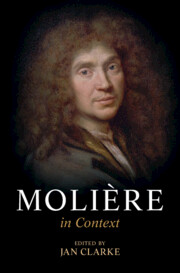Book contents
- Molière in Context
- Molière in Context
- Copyright page
- Dedication
- Contents
- Figures
- Charts and Tables
- Contributors
- Acknowledgements
- Translations
- Abbreviations
- Biographical Preface
- Part I Socio-Political Context
- Part II Intellectual and Artistic Context
- Chapter 7 Philosophical Influences
- Chapter 8 Molière and Classical Theatre
- Chapter 9 The Survival of Medieval and Renaissance Professional Practices
- Chapter 10 Commedia dell’arte
- Chapter 11 The Literary Establishment
- Chapter 12 Are the Précieuses Only Ridicules? Molière, Salon Culture and the Shaping of France’s Collective Memory
- Part III Theatrical Context (Paris)
- Part IV Theatrical Context (Court)
- Part V Reception and Dissemination
- Part VI Afterlives
- Further Reading
- Index
Chapter 8 - Molière and Classical Theatre
from Part II - Intellectual and Artistic Context
Published online by Cambridge University Press: 10 November 2022
- Molière in Context
- Molière in Context
- Copyright page
- Dedication
- Contents
- Figures
- Charts and Tables
- Contributors
- Acknowledgements
- Translations
- Abbreviations
- Biographical Preface
- Part I Socio-Political Context
- Part II Intellectual and Artistic Context
- Chapter 7 Philosophical Influences
- Chapter 8 Molière and Classical Theatre
- Chapter 9 The Survival of Medieval and Renaissance Professional Practices
- Chapter 10 Commedia dell’arte
- Chapter 11 The Literary Establishment
- Chapter 12 Are the Précieuses Only Ridicules? Molière, Salon Culture and the Shaping of France’s Collective Memory
- Part III Theatrical Context (Paris)
- Part IV Theatrical Context (Court)
- Part V Reception and Dissemination
- Part VI Afterlives
- Further Reading
- Index
Summary
During his lifetime and afterwards, Molière was frequently and favourably compared to Plautus and Terence by early modern commentators, despite the relative paucity of direct imitation or borrowing. Only three Molière plays have clear ties to classical sources: Amphitryon, L’Avare and Les Fourberies de Scapin. Even in these cases, Molière demonstrates a constant interest in updating, adapting, or even subverting his illustrious models, while also ostentatiously rejecting the authority of classical rules. However, in this regard Molière may be imitating the traditions of classical comedy more authentically than his early modern peers recognised. Terence and Plautus were criticised in their own time for their ‘contamination’ of sources, and their free use of prior plays and comedic tropes points to a freewheeling borrowing that is close to Molière’s in spirit. In addition, the Roman playwrights’ method of performing authorship, featured most prominently in the prologues to Terence’s plays, demonstrates a similar interest in stoking controversy and rejecting pedantic rules in favor of the audience’s pleasure. Molière may well have been classical, but precisely in those ways that most irritated his classically minded contemporaries.
- Type
- Chapter
- Information
- Molière in Context , pp. 81 - 89Publisher: Cambridge University PressPrint publication year: 2022



